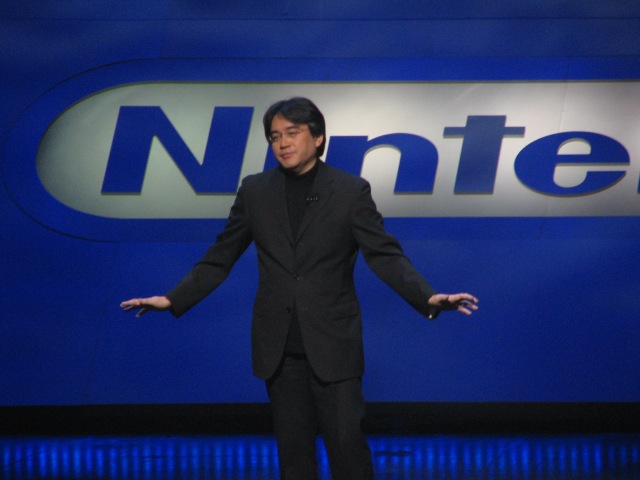I was at work when I heard about Nintendo President Satoru Iwata’s death. I read it in a tweet, then on Kotaku.

Satoru Iwata speaks at at the 2006 E3 Nintendo Press Conference. Image via lithcast.com
The news was shocking, and I mentioned it out loud. That launched a conversation between me and a coworker about, what else, Mario. She and I are a generation apart, but video games have been a solid common ground for us. She reminisced about staying up late with a friend, playing for hours trying to beat Mario 2. I told her about Mario Maker — a game touted at this year’s E3, where players can design and share their own Mario levels — and her eyes lit up.
This is part of what I love about gaming — this finding common interests with someone and sharing a love of something fun.
Games are as much an art form as movies and music, and art demands and creates communities — vibrant, evolving, crazy communities.
And Satoru Iwata was undeniably a massive part of that.
Iwata was born Dec. 6, 1959, according a brief release from Nintendo. He had been president of Nintendo since 2002, and CEO of Nintendo of America since 2013.
His financial impact on Nintendo is irrefutable. Bloomberg writes that, “Iwata led Nintendo since 2002 and helped oversee a tripling of revenue with hits including the Game Boy Advance SP and the Wii.” Nintendo’s entry into the world of mobile gaming, with Iwata’s blessing, is expected to help double Nintendo’s operating profit.
But Iwata’s impact on the gaming industry goes beyond just financial figures.
He was only the company’s fourth president since its founding in 1889, and the only president not descended from the founding Yamauchi family.
Iwata was a rarity in the gaming industry: a corporate president whose background was in game programming. He joined the Tokyo-based developer HAL Laboratory fresh out of college in the early [1980s], and immediately began working as a programmer, helping to create classic games like Balloon Fight and the Kirby’s Dream Land series for Nintendo.
According to Bloomberg, Iwata entered the gaming industry against his parents’ wishes. He would later go on to become president of HAL before becoming head of corporate planning for Nintendo in 2000.
“His passion for games was evinced most strongly in public through his prolific ‘Iwata Asks’ interviews,” writes Wired, “in which he picked the brains of Nintendo’s developers in ways that only he could, eliciting fascinating details about Nintendo’s creative process.”
Transcripts of those interviews can be found online, and they’re definitely worth a read. (Did you know that Shigeru Miyamoto wanted developers to make Majora’s Mask in just one year?)
Iwata showed the benefits of having someone in charge who knows and loves the nitty-gritty process of a company an industry. Having someone overseeing a company who understands how it all comes together is a huge boon for a company. And Iwata’s love for games only amplified that.
“Iwata brought a light and life to Nintendo that few other executives could manage,” Forbes writes. “He will be sorely missed there and in the industry at large.”
